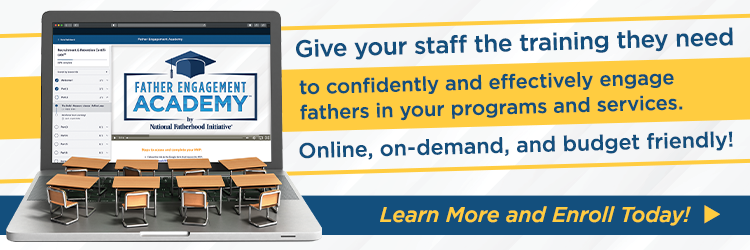
A new study sheds light on fatherhood programs’ integration of education on coparenting and healthy relationships. The findings have implications for any fatherhood program’s work on those two vital areas.
The Coparenting and Healthy Relationship Education for Dads (CHaRMED) qualitative study examined nine diverse, federally-funded fatherhood programs in the U.S. Researchers interviewed fatherhood program staff and participating fathers.
CHaRMED had three research objectives:
“Better understand the approaches that fatherhood programs use to support fathers’ healthy coparenting and romantic relationships.
Explore fathers’ perceptions of and needs around relationship programming.
Examine whether and how programs respond to those needs.”
The key findings were:
“Fatherhood programs support healthy relationships through multiple services and strategies. These approaches include curriculum-based workshops, one-on-one support, referrals to supplemental services, and coparent and family engagement in workshops and in other activities outside of the program. During the COVID-19 pandemic, programs have adapted by using multiple virtual approaches, which may be integrated into their models moving forward.
Fathers engage in healthy relationship content once they feel connected to the program. While most fathers are not drawn initially to fatherhood programs because of a desire to improve their coparenting or romantic relationships, they ultimately found value in healthy relationship content. Staff stressed that establishing this connection with fathers can require intensive intake efforts and engagement up front to gain fathers’ trust and create excitement about the fatherhood program as a whole.
Safe group spaces invite discussions around healthy relationships. Fathers spoke of the “brotherhood” that forms with others in their cohort. Staff play a critical role in creating a safe space that allows for honest discussions and peer learning around relationships.
Staff and participants view healthy relationship content as relevant and useful for fathers’ coparenting relationships. Staff described a tendency for discussions about healthy relationships during workshops and one-on-one engagement to focus more on coparenting than on romantic relationships, often due to greater challenges faced by fathers in their coparenting relationships than in their romantic relationships. Many fathers reported learning skills that they use to address these challenges.
Meaningful engagement of coparents in relationship programming is seen as beneficial, but with important tradeoffs and logistical challenges. For fathers and staff, there is a distinct tension between the value of coparent involvement in fatherhood programming and the need to respect a fathers-only space. Programs also reported challenges to successfully engaging coparents in programming, particularly when coparents and fathers were no longer in romantic relationships.
Fathers see access to children as a key challenge in their lives, which is complicated by challenging coparenting relationships and by legal and social systems. Some fathers described contentious coparenting relationships and legal and social systems as important factors that influence their ability to see their children and maintain relationships with them.”
National Fatherhood Initiative® (NFI) has a slew of resources that help organizations address coparenting and healthy relationships with fathers and mothers. From our Vital Topics Discussion Guides to our brochures for fathers and pocketbooks for mothers that address issues around coparenting (e.g. conflict resolution and child discipline) and healthy relationships (e.g. communication between parents) to our Co-Parenting Bundle that includes all of our most useful resources on coparenting, NFI can help your organization address those two vital areas at whatever depth you desire.
Speaking of depth. If you want to address coparenting and healthy relationships at a deep level, look no further than NFI’s Co-Parenting Curricula Bundle that features the evidence-based 24/7 Dad® and evidence-informed Understanding Dad™ programs. Many of our partners run these programs in tandem. Fathers go through 24/7 Dad® while at the same time the mothers of their children go through Understanding Dad™. I encourage you to learn more from evaluations of both programs.
Does your work with fathers and mothers address coparenting and healthy relationships?
Do you want to learn more about the CHaRMED study? Download the report here.
